Short Profile
Fabian M. Heß is a research associate at the Institute of Psychology, Department of Social Psychology. He is doing his PhD at the University of Leipzig on the intergroup conflict between radical Islam and radical anti-Islam. In his current research, he is investigating the motivational basics and relevant boundary conditions of radicalization processes.
Working Experience
- 10/2022
- Research stay at the Centre for Social Cognitive Studies, Jagiellonian University Krakow
- since 12/2020
Research associate and Ph.D. student in the BMBF joint project "Radical Islam versus radical anti-Islam (RIRA)", subproject: "Threat perceptions as factors of anti-Islamic radicalization and their pedagogical treatment" in the Department of Social Psychology, University of Leipzig - 06/2017 - 07/2018
Research assistant in the Department of Biological Psychology, University of Koblenz-Landau - 12/2016 - 08/2018
Research assistant in the Department of Social, Environmental, and Occupational Psychology, University of Koblenz-Landau
Education
- since 10/2020
Studies in philosophy in the European context (M. A.) at FernUniversität in Hagen - 10/2018 - 11/2020
Studies in psychology (M. Sc.) at the University of Leipzig - 10/2015 - 09/2018
Studies in psychology (B. Sc.) at the University of Koblenz-Landau - 10/2012 - 09/2015
Studies in philosophy and educational science (B. A.) at Martin-Luther-Universität Halle-Wittenberg
Hess, F. M., & Börner, E. (2023). The ABC of Stereotypes Among Muslims and Non-Muslims in Germany. Hikma, 14(1), 5-30. https://dx.doi.org/10.13109/hikm.2023.14.1.5
Hess, F. M., Celik, K., & Mücke, M. (2023). Typisch muslimisch – typisch deutsch? Stereotype im Spannungsfeld religiöser und nationaler Identität. In Gesellschaftliche Ausgangsbedingungen für Radikalisierung und Co-Radikalisierung (pp. 217-259). Wiesbaden: Springer. https://dx.doi.org/10.1007/978-3-658-40559-5_7
Hess, F. M., & Fritsche, I. (2023). Radikale in Not? Unbefriedigte soziale und psychologische Bedürfnisse als Motivatoren gruppenbasierter Radikalisierung. In Gesellschaftliche Ausgangsbedingungen für Radikalisierung und Co-Radikalisierung (pp. 103-146). Wiesbaden: Springer. https://dx.doi.org/10.1007/978-3-658-40559-5_4
Hess, F. M., & Grosche, C. (2022). Wir gegen die Anderen. Gruppenprozesse, Bedrohungsgefühle und Konflikte zwischen Gruppen als Treiber von Radikalisierungs- und Polarisierungstendenzen. Ligante. Fachdebatten aus der Präventionsarbeit, 5, 16-23. https://www.researchgate.net/publication/365201658_Wir_gegen_die_Anderen_Gruppenprozesse_Bedrohungsgefuhle_und_Konflikte_zwischen_Gruppen_als_Treiber_von_Radikalisierungs-_und_Polarisierungstendenzen_Ligante_Fachdebatten_aus_der_Praventionsarbeit_5_16
Pickel, S., Ceylan, R., Decker, O., Fritsche, I., Lütze, F. M., Pickel, G., Spielhaus, R., Uslucan, H.-H., Öztürk, C., Celik, K., Hess, F. M., Kaya, F., Krumpholz, P., Mücke, M., Schneider, V., Seiler, E., & Shalaby, R. (2021). Radikaler Islam vs. radikaler Anti-Islam. Gesellschaftliche Polarisierung und wahrgenommene Bedrohung als Triebfaktoren von Radikalisierungs- und Co-Radikalisierungsprozessen bei Jugendlichen und Post-Adoleszenten – ein Literaturbericht. RIRA. https://dx.doi.org/10.13140/RG.2.2.28591.10406
- Can “diverse” common identities de-escalate control depriving conflicts between Muslims and non-Muslims? Presentation at the 19th General Meeting of the European Association of Social Psychology in Kraków, July 3, 2023.
- Deterrent group radicalization: Boundary conditions of conformity to radical ingroup norms under lack of control. Presentation with Elisa Merkenschlager at the 4th Meeting of the German Political Psychology Network in Bielefeld, March 9, 2023.
- (Non-)radical response? Social norms and categorizations as moderators of threat to control effects on intergroup radicalization. Presentation at the HARMONIA & ALIADXS Meeting in Granada, February 22, 2023.
- Radikalisierungsspirale, Right-Wing Authoritarianism und Social Dominance Orientation. Presentation with Prof. Dr. Susanne Pickel at the RADIS-Meeting “Gesellschaftliche Ursachen und Wirkungen des radikalen Islam in Deutschland und Europa” in Bielefeld, February 14, 2023.
- Quest for significance and group-based control as possible motivations underlying radicalization into violence? Difficulties in demonstrating loss of significance effects on radicalization in three experiments. Presentation with Elisa Merkenschlager and Prof. Dr. Immo Fritsche at the 26th Workshop on Aggression in Jena, November 11, 2022.
- Dealing with radical Islamism as a threat to control and challenge for categorization on a superordinate level. Presentation at the 52nd Congress of the German Psychological Society in Hildesheim, September 13, 2022.
- Bringing Muslims and anti-Muslims together through a common national identity of “diverse Germany”. Presentation at the 22nd Jena Workshop on Intergroup Processes: National identity - Its nature, causes, and consequences at Schloss Eyba, July 3, 2022.
- Vier (bis fünf) Antworten auf die Frage, warum sich Personen radikalisieren. Presentation at the RADIS-Meeting "Radikalisierung verstehen, vorbeugen und begegnen" in Berlin, May 20, 2022.
- Radical Islam as a threat to control – but who are ‘they’, who are ‘we’? Presentation at the 3rd Meeting of the German Political Psychology Network in Chemnitz, March 11, 2022.
